Concept Analysis Report: Therapeutic Relationship in Healthcare - UAMS
VerifiedAdded on 2022/08/29
|7
|1657
|39
Report
AI Summary
This report presents a comprehensive concept analysis of 'Therapeutic Relationship,' a crucial element in healthcare, particularly within nursing. The analysis begins with an introduction and literature review, defining the term and exploring related concepts like healing and connection. It delves into defining attributes such as 'restorative' and 'bonding,' providing a model case of a nurse-patient interaction to illustrate the concept. The report examines antecedents, such as patient hesitancy, and consequences, like improved patient outcomes. It further discusses empirical referents, highlighting how communication and patient satisfaction reflect a strong therapeutic relationship. The report concludes with the implications for nursing practice, emphasizing the importance of empathy, compassion, and respect in establishing and maintaining these vital relationships. The references cited provide a strong academic base for the concepts discussed. The assignment is based on the assignment brief which focuses on the concept analysis of caring.
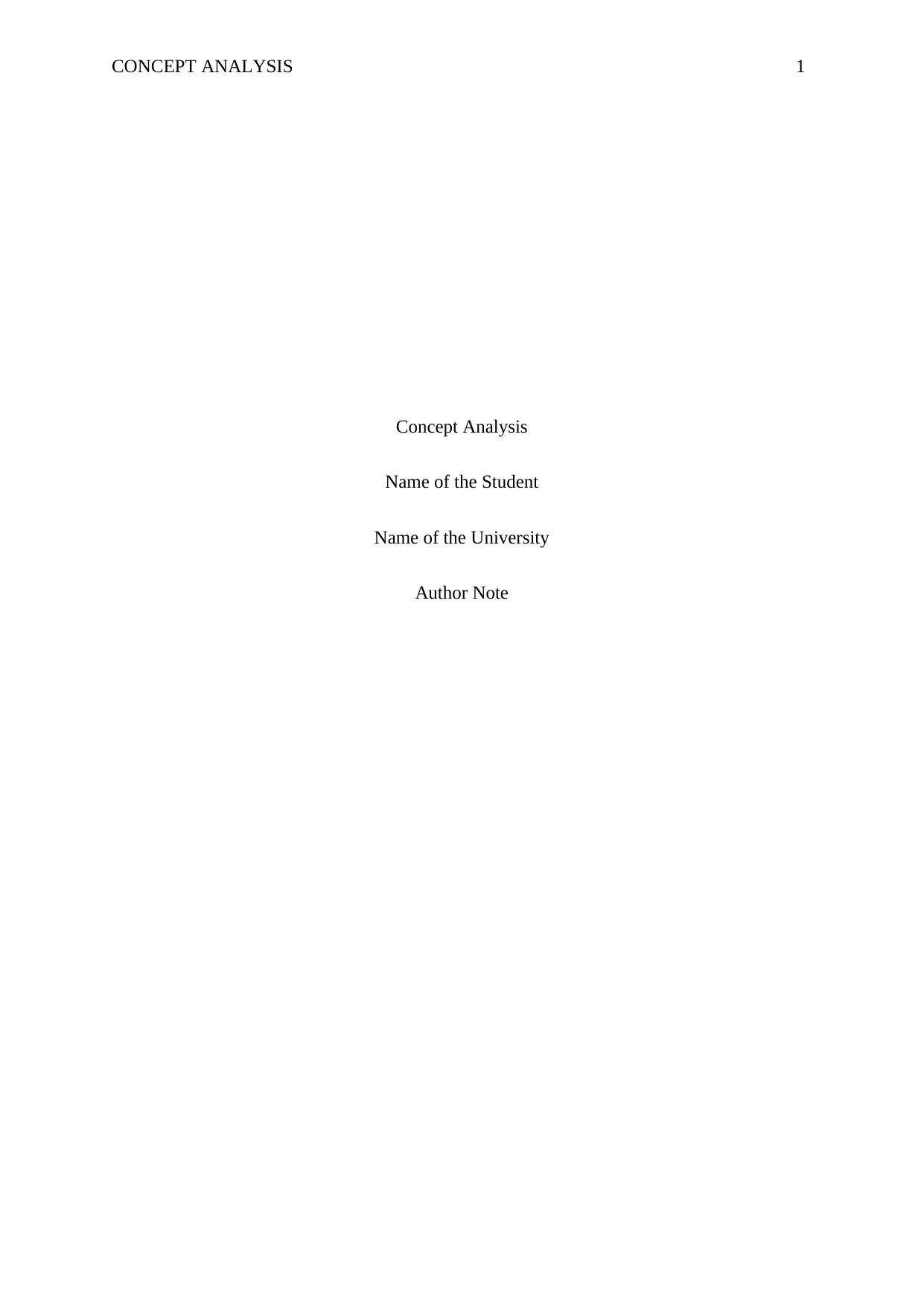
CONCEPT ANALYSIS 1
Concept Analysis
Name of the Student
Name of the University
Author Note
Concept Analysis
Name of the Student
Name of the University
Author Note
Paraphrase This Document
Need a fresh take? Get an instant paraphrase of this document with our AI Paraphraser
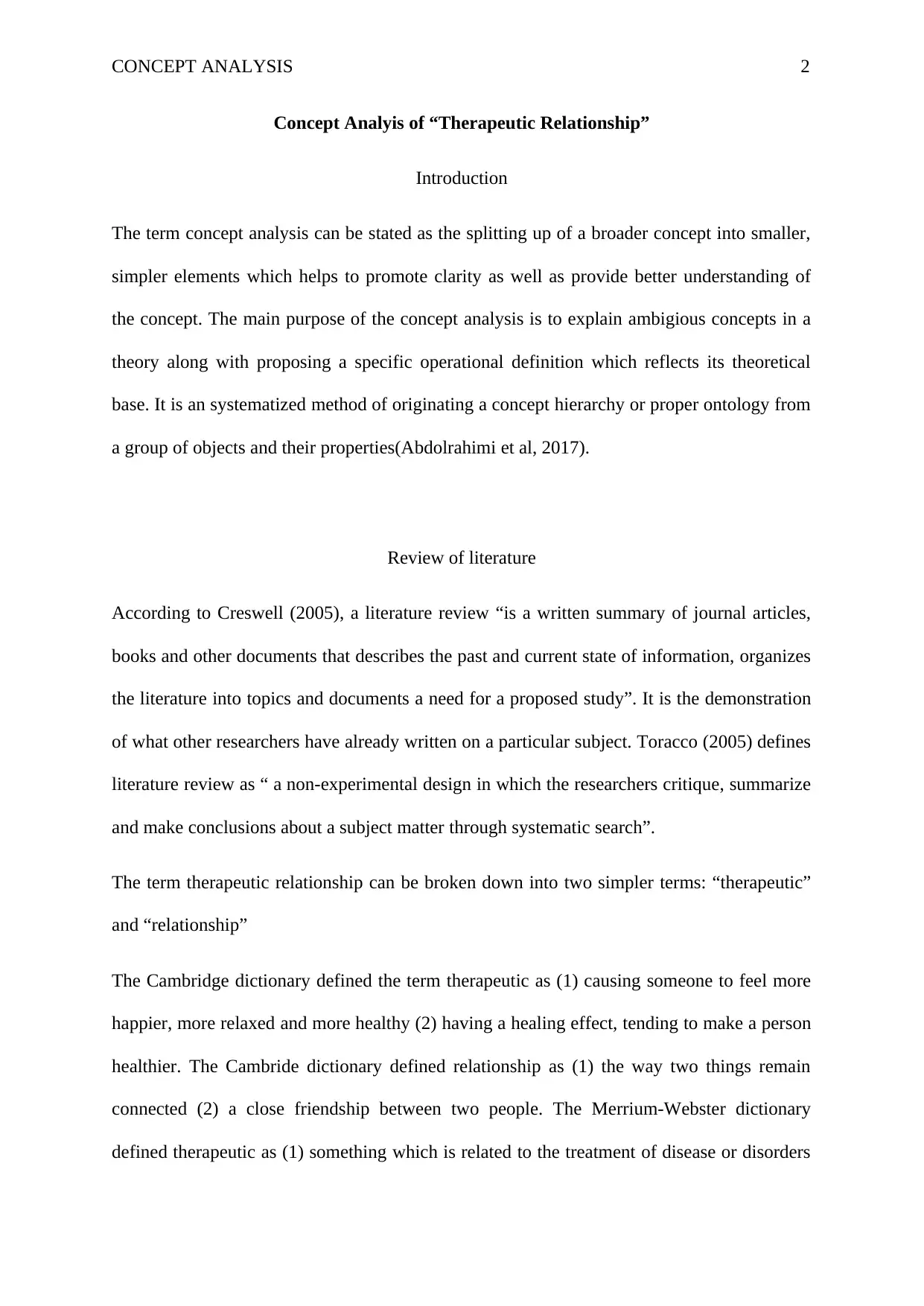
CONCEPT ANALYSIS 2
Concept Analyis of “Therapeutic Relationship”
Introduction
The term concept analysis can be stated as the splitting up of a broader concept into smaller,
simpler elements which helps to promote clarity as well as provide better understanding of
the concept. The main purpose of the concept analysis is to explain ambigious concepts in a
theory along with proposing a specific operational definition which reflects its theoretical
base. It is an systematized method of originating a concept hierarchy or proper ontology from
a group of objects and their properties(Abdolrahimi et al, 2017).
Review of literature
According to Creswell (2005), a literature review “is a written summary of journal articles,
books and other documents that describes the past and current state of information, organizes
the literature into topics and documents a need for a proposed study”. It is the demonstration
of what other researchers have already written on a particular subject. Toracco (2005) defines
literature review as “ a non-experimental design in which the researchers critique, summarize
and make conclusions about a subject matter through systematic search”.
The term therapeutic relationship can be broken down into two simpler terms: “therapeutic”
and “relationship”
The Cambridge dictionary defined the term therapeutic as (1) causing someone to feel more
happier, more relaxed and more healthy (2) having a healing effect, tending to make a person
healthier. The Cambride dictionary defined relationship as (1) the way two things remain
connected (2) a close friendship between two people. The Merrium-Webster dictionary
defined therapeutic as (1) something which is related to the treatment of disease or disorders
Concept Analyis of “Therapeutic Relationship”
Introduction
The term concept analysis can be stated as the splitting up of a broader concept into smaller,
simpler elements which helps to promote clarity as well as provide better understanding of
the concept. The main purpose of the concept analysis is to explain ambigious concepts in a
theory along with proposing a specific operational definition which reflects its theoretical
base. It is an systematized method of originating a concept hierarchy or proper ontology from
a group of objects and their properties(Abdolrahimi et al, 2017).
Review of literature
According to Creswell (2005), a literature review “is a written summary of journal articles,
books and other documents that describes the past and current state of information, organizes
the literature into topics and documents a need for a proposed study”. It is the demonstration
of what other researchers have already written on a particular subject. Toracco (2005) defines
literature review as “ a non-experimental design in which the researchers critique, summarize
and make conclusions about a subject matter through systematic search”.
The term therapeutic relationship can be broken down into two simpler terms: “therapeutic”
and “relationship”
The Cambridge dictionary defined the term therapeutic as (1) causing someone to feel more
happier, more relaxed and more healthy (2) having a healing effect, tending to make a person
healthier. The Cambride dictionary defined relationship as (1) the way two things remain
connected (2) a close friendship between two people. The Merrium-Webster dictionary
defined therapeutic as (1) something which is related to the treatment of disease or disorders
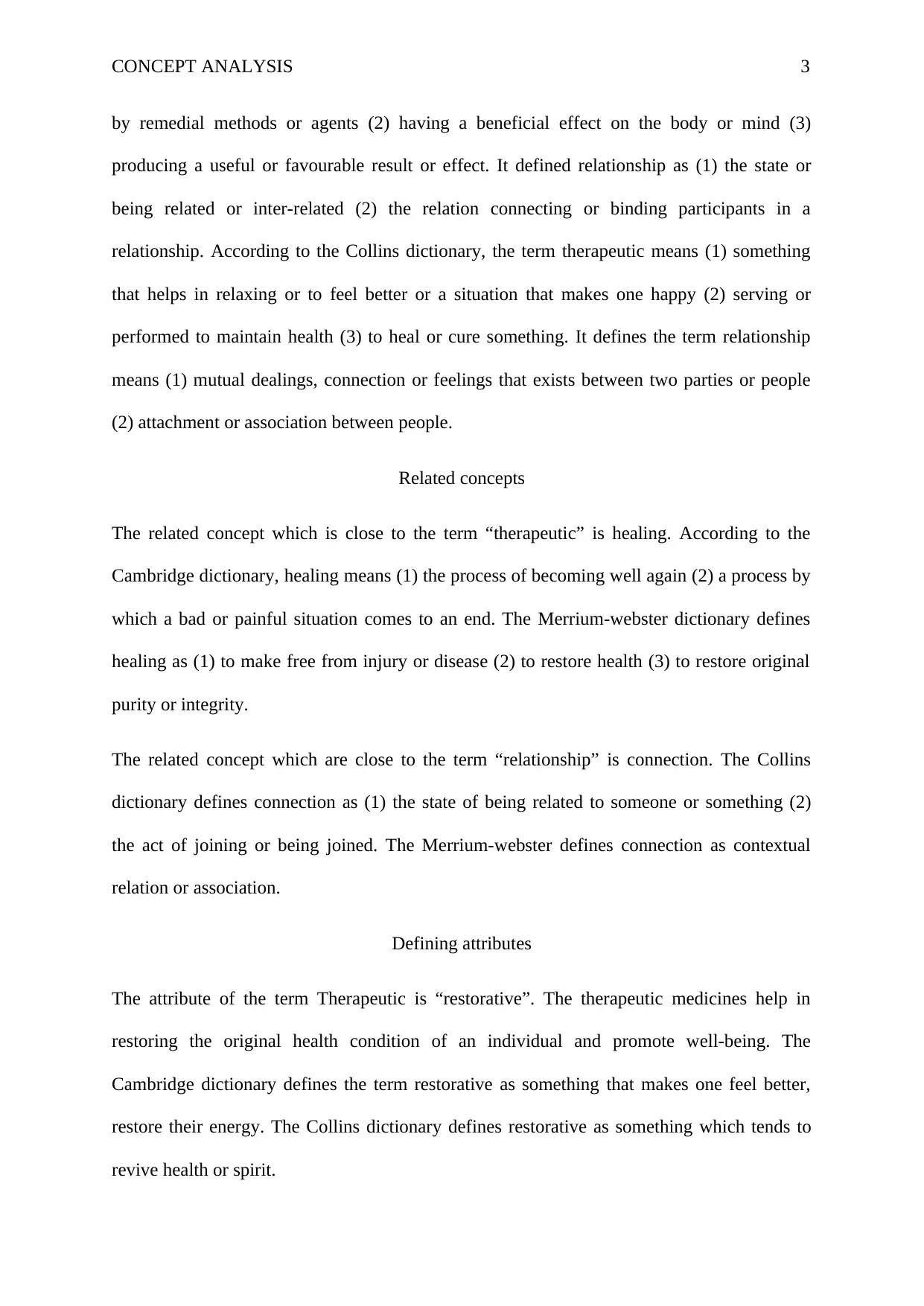
CONCEPT ANALYSIS 3
by remedial methods or agents (2) having a beneficial effect on the body or mind (3)
producing a useful or favourable result or effect. It defined relationship as (1) the state or
being related or inter-related (2) the relation connecting or binding participants in a
relationship. According to the Collins dictionary, the term therapeutic means (1) something
that helps in relaxing or to feel better or a situation that makes one happy (2) serving or
performed to maintain health (3) to heal or cure something. It defines the term relationship
means (1) mutual dealings, connection or feelings that exists between two parties or people
(2) attachment or association between people.
Related concepts
The related concept which is close to the term “therapeutic” is healing. According to the
Cambridge dictionary, healing means (1) the process of becoming well again (2) a process by
which a bad or painful situation comes to an end. The Merrium-webster dictionary defines
healing as (1) to make free from injury or disease (2) to restore health (3) to restore original
purity or integrity.
The related concept which are close to the term “relationship” is connection. The Collins
dictionary defines connection as (1) the state of being related to someone or something (2)
the act of joining or being joined. The Merrium-webster defines connection as contextual
relation or association.
Defining attributes
The attribute of the term Therapeutic is “restorative”. The therapeutic medicines help in
restoring the original health condition of an individual and promote well-being. The
Cambridge dictionary defines the term restorative as something that makes one feel better,
restore their energy. The Collins dictionary defines restorative as something which tends to
revive health or spirit.
by remedial methods or agents (2) having a beneficial effect on the body or mind (3)
producing a useful or favourable result or effect. It defined relationship as (1) the state or
being related or inter-related (2) the relation connecting or binding participants in a
relationship. According to the Collins dictionary, the term therapeutic means (1) something
that helps in relaxing or to feel better or a situation that makes one happy (2) serving or
performed to maintain health (3) to heal or cure something. It defines the term relationship
means (1) mutual dealings, connection or feelings that exists between two parties or people
(2) attachment or association between people.
Related concepts
The related concept which is close to the term “therapeutic” is healing. According to the
Cambridge dictionary, healing means (1) the process of becoming well again (2) a process by
which a bad or painful situation comes to an end. The Merrium-webster dictionary defines
healing as (1) to make free from injury or disease (2) to restore health (3) to restore original
purity or integrity.
The related concept which are close to the term “relationship” is connection. The Collins
dictionary defines connection as (1) the state of being related to someone or something (2)
the act of joining or being joined. The Merrium-webster defines connection as contextual
relation or association.
Defining attributes
The attribute of the term Therapeutic is “restorative”. The therapeutic medicines help in
restoring the original health condition of an individual and promote well-being. The
Cambridge dictionary defines the term restorative as something that makes one feel better,
restore their energy. The Collins dictionary defines restorative as something which tends to
revive health or spirit.
⊘ This is a preview!⊘
Do you want full access?
Subscribe today to unlock all pages.

Trusted by 1+ million students worldwide
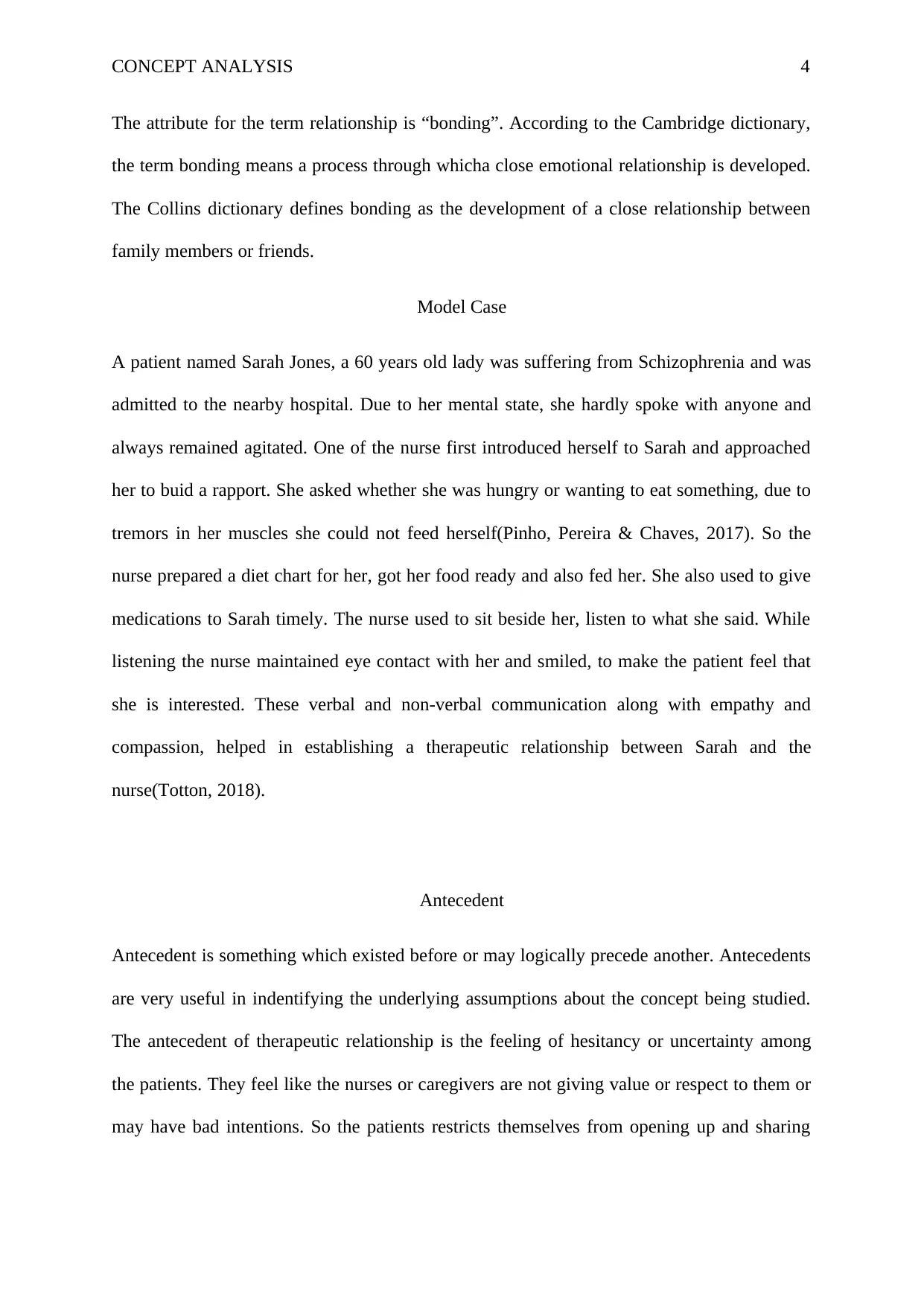
CONCEPT ANALYSIS 4
The attribute for the term relationship is “bonding”. According to the Cambridge dictionary,
the term bonding means a process through whicha close emotional relationship is developed.
The Collins dictionary defines bonding as the development of a close relationship between
family members or friends.
Model Case
A patient named Sarah Jones, a 60 years old lady was suffering from Schizophrenia and was
admitted to the nearby hospital. Due to her mental state, she hardly spoke with anyone and
always remained agitated. One of the nurse first introduced herself to Sarah and approached
her to buid a rapport. She asked whether she was hungry or wanting to eat something, due to
tremors in her muscles she could not feed herself(Pinho, Pereira & Chaves, 2017). So the
nurse prepared a diet chart for her, got her food ready and also fed her. She also used to give
medications to Sarah timely. The nurse used to sit beside her, listen to what she said. While
listening the nurse maintained eye contact with her and smiled, to make the patient feel that
she is interested. These verbal and non-verbal communication along with empathy and
compassion, helped in establishing a therapeutic relationship between Sarah and the
nurse(Totton, 2018).
Antecedent
Antecedent is something which existed before or may logically precede another. Antecedents
are very useful in indentifying the underlying assumptions about the concept being studied.
The antecedent of therapeutic relationship is the feeling of hesitancy or uncertainty among
the patients. They feel like the nurses or caregivers are not giving value or respect to them or
may have bad intentions. So the patients restricts themselves from opening up and sharing
The attribute for the term relationship is “bonding”. According to the Cambridge dictionary,
the term bonding means a process through whicha close emotional relationship is developed.
The Collins dictionary defines bonding as the development of a close relationship between
family members or friends.
Model Case
A patient named Sarah Jones, a 60 years old lady was suffering from Schizophrenia and was
admitted to the nearby hospital. Due to her mental state, she hardly spoke with anyone and
always remained agitated. One of the nurse first introduced herself to Sarah and approached
her to buid a rapport. She asked whether she was hungry or wanting to eat something, due to
tremors in her muscles she could not feed herself(Pinho, Pereira & Chaves, 2017). So the
nurse prepared a diet chart for her, got her food ready and also fed her. She also used to give
medications to Sarah timely. The nurse used to sit beside her, listen to what she said. While
listening the nurse maintained eye contact with her and smiled, to make the patient feel that
she is interested. These verbal and non-verbal communication along with empathy and
compassion, helped in establishing a therapeutic relationship between Sarah and the
nurse(Totton, 2018).
Antecedent
Antecedent is something which existed before or may logically precede another. Antecedents
are very useful in indentifying the underlying assumptions about the concept being studied.
The antecedent of therapeutic relationship is the feeling of hesitancy or uncertainty among
the patients. They feel like the nurses or caregivers are not giving value or respect to them or
may have bad intentions. So the patients restricts themselves from opening up and sharing
Paraphrase This Document
Need a fresh take? Get an instant paraphrase of this document with our AI Paraphraser
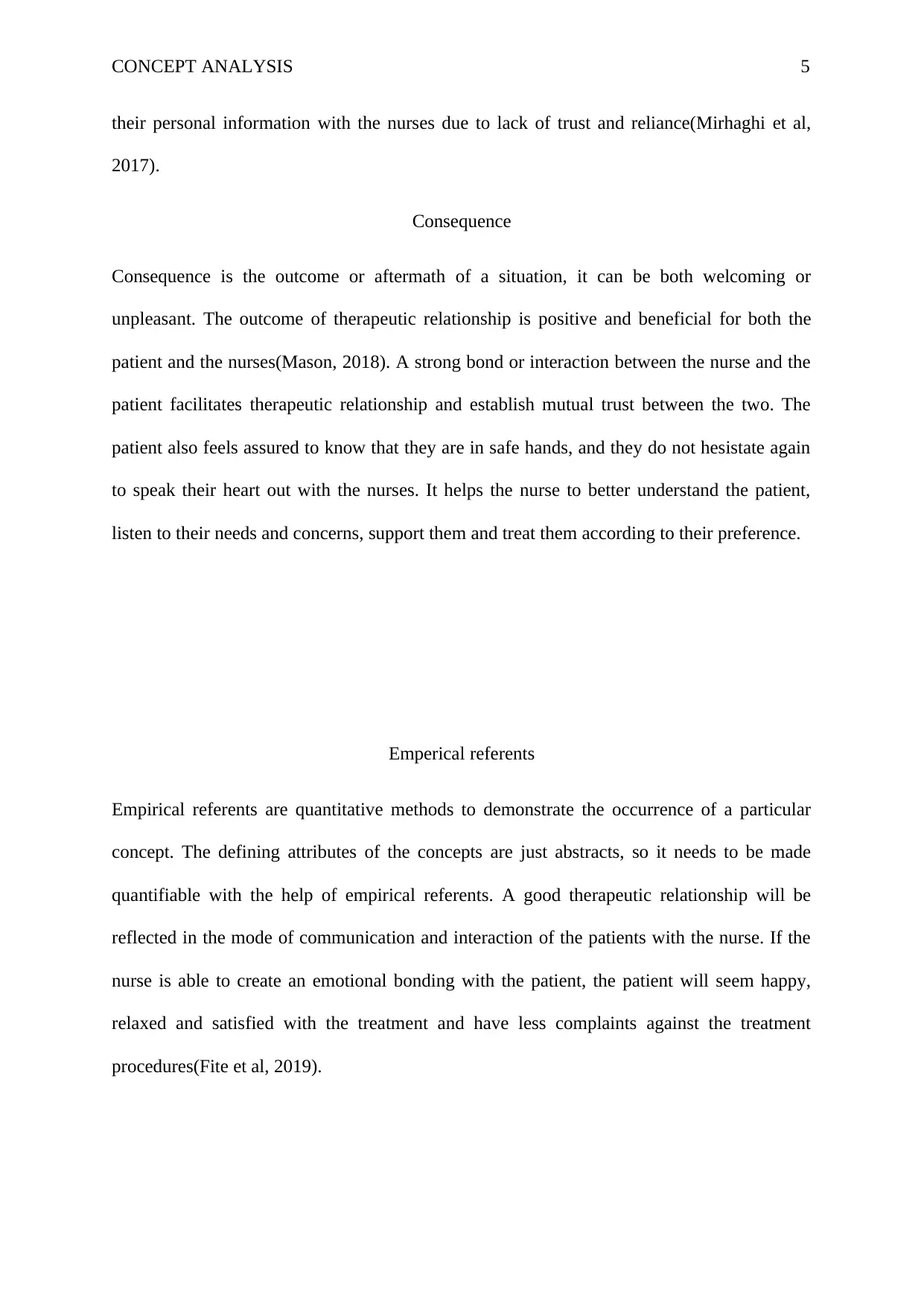
CONCEPT ANALYSIS 5
their personal information with the nurses due to lack of trust and reliance(Mirhaghi et al,
2017).
Consequence
Consequence is the outcome or aftermath of a situation, it can be both welcoming or
unpleasant. The outcome of therapeutic relationship is positive and beneficial for both the
patient and the nurses(Mason, 2018). A strong bond or interaction between the nurse and the
patient facilitates therapeutic relationship and establish mutual trust between the two. The
patient also feels assured to know that they are in safe hands, and they do not hesistate again
to speak their heart out with the nurses. It helps the nurse to better understand the patient,
listen to their needs and concerns, support them and treat them according to their preference.
Emperical referents
Empirical referents are quantitative methods to demonstrate the occurrence of a particular
concept. The defining attributes of the concepts are just abstracts, so it needs to be made
quantifiable with the help of empirical referents. A good therapeutic relationship will be
reflected in the mode of communication and interaction of the patients with the nurse. If the
nurse is able to create an emotional bonding with the patient, the patient will seem happy,
relaxed and satisfied with the treatment and have less complaints against the treatment
procedures(Fite et al, 2019).
their personal information with the nurses due to lack of trust and reliance(Mirhaghi et al,
2017).
Consequence
Consequence is the outcome or aftermath of a situation, it can be both welcoming or
unpleasant. The outcome of therapeutic relationship is positive and beneficial for both the
patient and the nurses(Mason, 2018). A strong bond or interaction between the nurse and the
patient facilitates therapeutic relationship and establish mutual trust between the two. The
patient also feels assured to know that they are in safe hands, and they do not hesistate again
to speak their heart out with the nurses. It helps the nurse to better understand the patient,
listen to their needs and concerns, support them and treat them according to their preference.
Emperical referents
Empirical referents are quantitative methods to demonstrate the occurrence of a particular
concept. The defining attributes of the concepts are just abstracts, so it needs to be made
quantifiable with the help of empirical referents. A good therapeutic relationship will be
reflected in the mode of communication and interaction of the patients with the nurse. If the
nurse is able to create an emotional bonding with the patient, the patient will seem happy,
relaxed and satisfied with the treatment and have less complaints against the treatment
procedures(Fite et al, 2019).
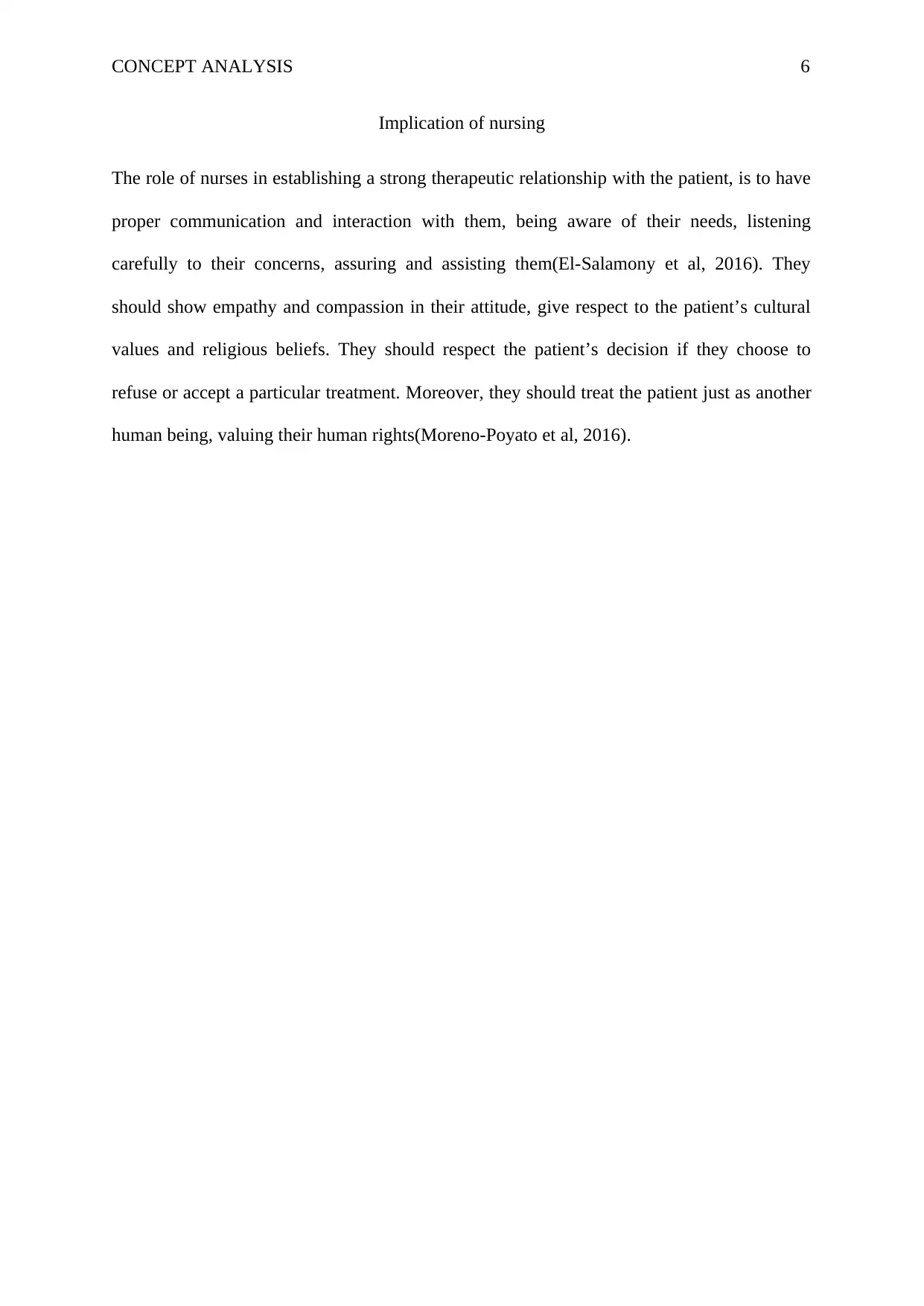
CONCEPT ANALYSIS 6
Implication of nursing
The role of nurses in establishing a strong therapeutic relationship with the patient, is to have
proper communication and interaction with them, being aware of their needs, listening
carefully to their concerns, assuring and assisting them(El-Salamony et al, 2016). They
should show empathy and compassion in their attitude, give respect to the patient’s cultural
values and religious beliefs. They should respect the patient’s decision if they choose to
refuse or accept a particular treatment. Moreover, they should treat the patient just as another
human being, valuing their human rights(Moreno-Poyato et al, 2016).
Implication of nursing
The role of nurses in establishing a strong therapeutic relationship with the patient, is to have
proper communication and interaction with them, being aware of their needs, listening
carefully to their concerns, assuring and assisting them(El-Salamony et al, 2016). They
should show empathy and compassion in their attitude, give respect to the patient’s cultural
values and religious beliefs. They should respect the patient’s decision if they choose to
refuse or accept a particular treatment. Moreover, they should treat the patient just as another
human being, valuing their human rights(Moreno-Poyato et al, 2016).
⊘ This is a preview!⊘
Do you want full access?
Subscribe today to unlock all pages.

Trusted by 1+ million students worldwide
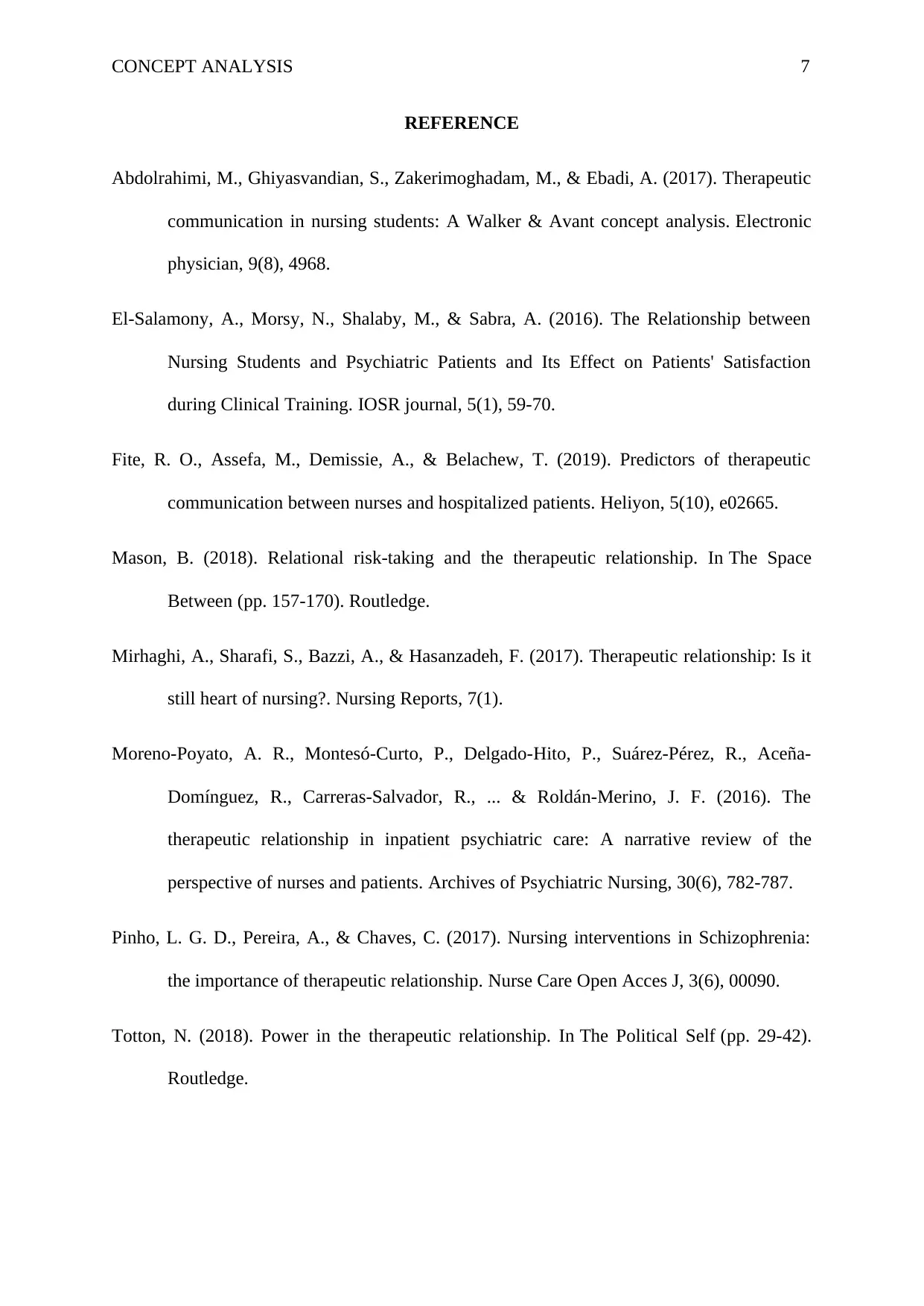
CONCEPT ANALYSIS 7
REFERENCE
Abdolrahimi, M., Ghiyasvandian, S., Zakerimoghadam, M., & Ebadi, A. (2017). Therapeutic
communication in nursing students: A Walker & Avant concept analysis. Electronic
physician, 9(8), 4968.
El-Salamony, A., Morsy, N., Shalaby, M., & Sabra, A. (2016). The Relationship between
Nursing Students and Psychiatric Patients and Its Effect on Patients' Satisfaction
during Clinical Training. IOSR journal, 5(1), 59-70.
Fite, R. O., Assefa, M., Demissie, A., & Belachew, T. (2019). Predictors of therapeutic
communication between nurses and hospitalized patients. Heliyon, 5(10), e02665.
Mason, B. (2018). Relational risk-taking and the therapeutic relationship. In The Space
Between (pp. 157-170). Routledge.
Mirhaghi, A., Sharafi, S., Bazzi, A., & Hasanzadeh, F. (2017). Therapeutic relationship: Is it
still heart of nursing?. Nursing Reports, 7(1).
Moreno-Poyato, A. R., Montesó-Curto, P., Delgado-Hito, P., Suárez-Pérez, R., Aceña-
Domínguez, R., Carreras-Salvador, R., ... & Roldán-Merino, J. F. (2016). The
therapeutic relationship in inpatient psychiatric care: A narrative review of the
perspective of nurses and patients. Archives of Psychiatric Nursing, 30(6), 782-787.
Pinho, L. G. D., Pereira, A., & Chaves, C. (2017). Nursing interventions in Schizophrenia:
the importance of therapeutic relationship. Nurse Care Open Acces J, 3(6), 00090.
Totton, N. (2018). Power in the therapeutic relationship. In The Political Self (pp. 29-42).
Routledge.
REFERENCE
Abdolrahimi, M., Ghiyasvandian, S., Zakerimoghadam, M., & Ebadi, A. (2017). Therapeutic
communication in nursing students: A Walker & Avant concept analysis. Electronic
physician, 9(8), 4968.
El-Salamony, A., Morsy, N., Shalaby, M., & Sabra, A. (2016). The Relationship between
Nursing Students and Psychiatric Patients and Its Effect on Patients' Satisfaction
during Clinical Training. IOSR journal, 5(1), 59-70.
Fite, R. O., Assefa, M., Demissie, A., & Belachew, T. (2019). Predictors of therapeutic
communication between nurses and hospitalized patients. Heliyon, 5(10), e02665.
Mason, B. (2018). Relational risk-taking and the therapeutic relationship. In The Space
Between (pp. 157-170). Routledge.
Mirhaghi, A., Sharafi, S., Bazzi, A., & Hasanzadeh, F. (2017). Therapeutic relationship: Is it
still heart of nursing?. Nursing Reports, 7(1).
Moreno-Poyato, A. R., Montesó-Curto, P., Delgado-Hito, P., Suárez-Pérez, R., Aceña-
Domínguez, R., Carreras-Salvador, R., ... & Roldán-Merino, J. F. (2016). The
therapeutic relationship in inpatient psychiatric care: A narrative review of the
perspective of nurses and patients. Archives of Psychiatric Nursing, 30(6), 782-787.
Pinho, L. G. D., Pereira, A., & Chaves, C. (2017). Nursing interventions in Schizophrenia:
the importance of therapeutic relationship. Nurse Care Open Acces J, 3(6), 00090.
Totton, N. (2018). Power in the therapeutic relationship. In The Political Self (pp. 29-42).
Routledge.
1 out of 7
Your All-in-One AI-Powered Toolkit for Academic Success.
+13062052269
info@desklib.com
Available 24*7 on WhatsApp / Email
![[object Object]](/_next/static/media/star-bottom.7253800d.svg)
Unlock your academic potential
Copyright © 2020–2026 A2Z Services. All Rights Reserved. Developed and managed by ZUCOL.


